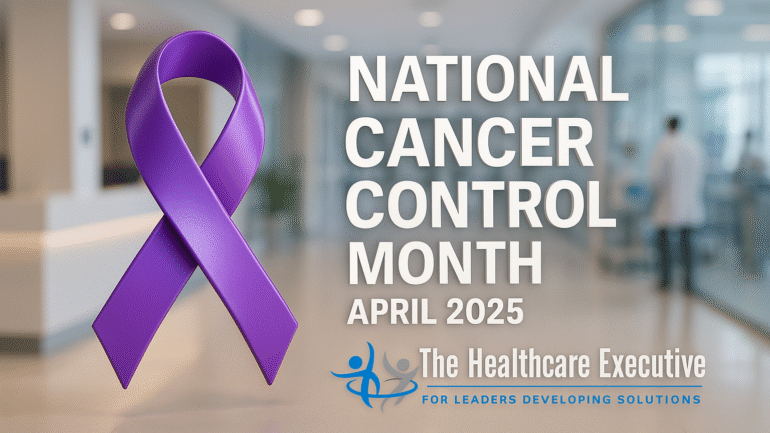National Cancer Control Month – April 2025

- Posted by Greg Wahlstrom, MBA, HCM
- Posted in Health Observance Calendar
Executive Leadership for Prevention, Equity, and Early Detection
Published: April 6, 2025
April marks National Cancer Control Month, a time for health systems to elevate prevention, early detection, and coordinated care as national priorities. More than 600,000 Americans are expected to die from cancer in 2025, and disparities in screening, diagnosis, and treatment outcomes persist across race, geography, and socioeconomic status. Hospital executives play a pivotal role in shaping the infrastructure that determines whether a patient’s disease is caught early—or too late. At institutions like MD Anderson Cancer Center, cross-disciplinary coordination, high-risk navigation programs, and community partnerships are embedded into long-term oncology strategy. For systems seeking to lead, Cancer Control Month is a powerful opportunity to launch new initiatives, reinforce performance metrics, and renew public trust in access to lifesaving care. Leadership at the top must ensure that cancer prevention is not a campaign—it is a command structure.
Preventing cancer requires strategic alignment between primary care, specialty referrals, and public health messaging. Many hospitals still operate in silos, where mammography, colonoscopy, and lung screening rates vary dramatically by department or location. This fragmentation limits both outcomes and accountability. Systems like NewYork-Presbyterian are reducing these silos through centralized oncology command centers that oversee screening compliance and outreach across service lines. At The Healthcare Executive, we highlighted similar strategies in our article Advancing Health Equity Through Strategic Initiatives. Executive leaders must develop incentive structures that reward prevention—not just procedural volume. Cancer control doesn’t start in the OR; it starts in the boardroom with strategic clarity.
The burden of cancer is not evenly shared. Patients in rural areas are more likely to be diagnosed at later stages, while racial and ethnic minorities face barriers to genetic testing, timely referrals, and inclusion in clinical trials. Addressing these gaps requires not only funding but direct executive involvement in designing solutions. At RWJBarnabas Health, a systemwide Cancer Equity Task Force evaluates data disaggregation, social determinants of health, and trust-based community engagement. Hospitals must move beyond generic DEI statements and build concrete governance that links equity to outcomes. Cancer equity must be a standing item on every strategy agenda—not a one-time campaign theme.
Technology is also reshaping how cancer control is operationalized. AI-driven radiology, biomarker-based risk modeling, and precision population health dashboards allow executives to manage cancer pathways in real time. Yet without executive oversight, technology can reinforce bias or fail to reach underserved patients. In our article AI in the C-Suite: Redefining Decision-Making for Healthcare Executives, we explore how leadership must guide tech governance with a focus on inclusion. Digital transformation in oncology is not optional—it is inevitable. The question is whether executive teams are prepared to lead it responsibly, or follow it reactively.
April 2025 is more than a time to wear a ribbon—it is a call to realign institutional purpose around cancer prevention, detection, and care. Executives must champion not only policy but implementation: funding mobile screening units, staffing cancer nurse navigators, expanding multilingual education, and partnering with local leaders to close gaps. Resources from The Prevent Cancer Foundation and the CDC’s National Comprehensive Cancer Control Program provide evidence-based tools for hospitals ready to lead. The Healthcare Executive remains committed to helping leaders design cancer strategies that reach every ZIP code—not just those within the walls of major institutions. Cancer control is not just a clinical goal—it is a test of institutional courage and consistency.
Discover More:
If your leadership team is rethinking how trust, equity, and communication shape long-term oncology strategy, we recommend this executive resource from our blog.
Internal Links
- Advancing Health Equity Through Strategic Initiatives
- AI in the C-Suite: Redefining Decision-Making for Healthcare Executives
- Trust as a Strategic Asset: Reputation, Outcomes, and the Patient Voice



